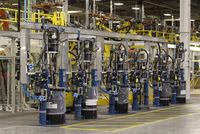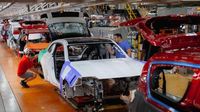Stellantis NV has announced a temporary shutdown of its Windsor Assembly Plant in Ontario, set to begin on April 7, 2025, due to the recent imposition of tariffs by U.S. President Donald Trump. This decision, communicated to Unifor Local 444, the union representing the plant's workers, will halt production for two weeks, with operations expected to resume the week of April 21, 2025.
The shutdown follows Trump's "Liberation Day" announcement, during which he confirmed a 25% tariff on foreign-made automobiles and parts. According to Unifor Local 444 President James Stewart, the union was aware of potential downtime but noted that the final decision was primarily driven by the tariff announcement. "This has and continues to create uncertainty across the entire auto industry," Stewart stated in a social media post.
The Windsor Assembly Plant is a key facility for Stellantis, producing popular models such as the Chrysler Pacifica minivan, Chrysler Grand Caravan, Chrysler Voyager, and the Dodge Charger Daytona. The plant employs approximately 3,600 hourly workers, and the shutdown is expected to have ripple effects not only on the Windsor facility but also on other Stellantis operations in the U.S. and Mexico.
In a statement, Stellantis acknowledged the impact of the tariffs on its operations, indicating that they are actively assessing the situation. "Immediate actions we must take include temporarily pausing production at some of our Canadian and Mexican assembly plants, which will have an impact on several of our U.S. powertrain and stamping facilities that support those operations," the company said.
The tariffs, set to take effect just after midnight on April 3, 2025, apply a 25% charge on all vehicles, excluding a portion of Canadian-made autos that contain U.S. content. Vehicles manufactured in Ontario typically include about 50% U.S. content. This new tariff regime comes on top of existing tariffs imposed by the Trump administration on steel and aluminum, as well as tariffs targeting specific countries like China.
Industry experts have voiced concerns about the broader implications of these tariffs. Flavio Volpe, head of the Automotive Parts Manufacturers' Association, warned that the industry, which operates on profit margins of less than 10%, cannot sustain double-digit tariffs. "Start the countdown to a shutdown," Volpe remarked, emphasizing that the ability to manufacture cars hinges on the availability of parts. "You can’t make cars without all the parts. It just takes one major parts supplier or major automaker to say, ‘We’re not doing this.'"
Linda Hasenfratz, executive chair of auto parts manufacturer Linamar Corp., echoed these sentiments, suggesting that the tariffs could bring the North American auto industry to a standstill within a week. James Farley, CEO of Ford Motor Company, previously warned that the tariffs would "blow a hole" in the industry, leading to increased costs and chaos.
As the situation unfolds, Unifor has condemned the tariffs as "job-killing," with National President Lana Payne criticizing Trump’s approach. "Trump is gaslighting us, wanting us to be grateful for not having reciprocal tariffs imposed on Canada while he tries to pick off our domestic industries one by one. We won’t fall for it," Payne stated, urging the Canadian government to respond firmly to the U.S. tariffs, which disproportionately affect Canadian workers.
With the Windsor Assembly Plant's shutdown, the uncertainty surrounding the auto industry is palpable. Stewart reassured workers, stating that the union is closely monitoring the situation and will continue to advocate for clarity and accountability from Stellantis. He acknowledged the frustration and anxiety that the shutdown brings to workers and their families.
As the auto industry braces for the impact of these tariffs, the potential for further plant closures looms large. Sam Fiorani, vice president of global vehicles forecasting at AutoForecast Solutions, indicated that more such pauses in production are likely. He noted that relocating manufacturing capacity to the U.S. is a lengthy process, often taking one to two years to retool a factory and three years or more to construct a new plant.
In 2024, Ontario's auto plants, including those operated by Ford, General Motors, Stellantis, Honda, and Toyota, produced a total of 1.6 million passenger vehicles, most of which were exported to the United States. The Canadian auto industry employs approximately 125,000 people, and each assembly plant is supported by numerous independent parts suppliers from North America and beyond.
As the dust settles from the latest tariff announcement, the future of the Windsor Assembly Plant and the broader North American auto industry remains uncertain. The coming weeks will be critical as Stellantis and its workers navigate the challenges posed by these tariffs, which threaten to reshape the landscape of auto manufacturing in the region.







